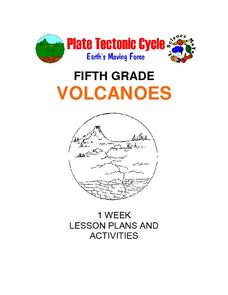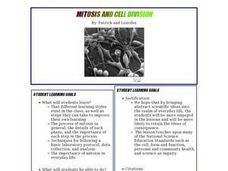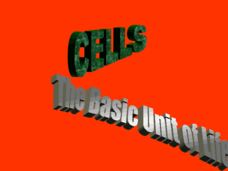Biology Junction
Strawberry DNA
Humans eat around 93,205 miles of DNA in an average meal. Scholars learn how to extract DNA from a strawberry using a presentation. It walks through each step and explains why the process works. Comprehension questions encourage...
University of Maryland
Pollination
Sixteen ounces of honey requires more than 1,000 bees traveling over 100,000 miles and visiting 4.5 million flowers. The presentation includes sexual reproduction in plants, the parts and functions of a flower,...
Curated OER
Comet Myths, Facts, and Legends
Here is an interactive book lesson through which learners explore the facts and stories about comets. The plan is comprehensive, providing background information, standards met, vocabulary, assessment ideas, and more. Though the content...
Curated OER
DNA on Stick
Students experience a "hands-on" activity to get visual evidence of the physical nature of DNA and the process of DNA purification. They explore one method of chromosomal DNA isolation and DNA extraction.
Curated OER
Extracting DNA from Your Cells
Three steps are needed to extract DNA from learners' inner cheek cells. The procedure and reasons for each step are explained. As enzymes work on the cells, a series of questions are answered regarding the structure of the DNA molecule....
K12 Reader
What’s in Your Cells?
Organelles, cellular respiration, ATP, and DNA. The passage attached to this life science reading comprehension activity is all about cells. After reading about diffusion and osmosis, kids answer a series of questions based on the text.
T. Trimpe
Atomic Basics
Get down to basics with these worksheets on the structure of atoms. Challenging young chemists to identify information from the periodic table and create Bohr diagrams and Lewis dot structures for different elements, this...
Curated OER
Earthquakes: Third Grade Lesson Plans and Activities
Introduce third graders to energy waves with a hands-on geology activity, in which they answer questions and compare seismograms in the San Francisco Bay area. After a demonstration that shows how bigger waves indicate a...
Curated OER
Volcanoes: Fifth Grade Lesson Plans and Activities
Fifth graders explore volcanoes and the rocks they produce using the Internet. The lab portion of the lesson prompts young scientists to compare and describe igneous rocks. Next, they critique a pair or more of...
Curated OER
Volcanoes: Sixth Grade Lesson Plans and Activities
Bring a set of pre-lab, lab, and post-lab lesson plans on volcanoes to your earth science unit. Sixth graders explore the three types of volcanoes found on Earth, plot the specific locations of these volcanoes on a map, and...
Curated OER
Earthquakes: Sixth Grade Lesson Plans and Activities
Young seismologists learn more about plate tectonics with a set of pre-lab, lab, and post-lab lessons plans on earthquakes. After exploring how waves travel through various materials, sixth graders record their observations and...
LABScI
Circuits Lab: Lightbulbs
Electrons flow from negative to positive, but the general consensus is that current flows from positive to negative. Scholars explore current through construction of circuits in both series and parallel. The focus is on voltage,...
Curated OER
Oobleck
Here is a good lesson which aptly describes how to do the classic "Oobleck" lab with your young scientists. Unfortunately, the "Oobleck Investigation Sheet" in the plan doesn't open. However, this is a very clear description about how to...
Curated OER
Student Reading - The Unique Properties of Water
Without water there would be no life on this planet. Biology learners find out why by reading this handout. Create a worksheet of questions to answer after the reading. Follow it up with quick demonstrations or laboratory activities that...
Curated OER
Mitosis and Cell Division
Students discover the processes that occur during mitosis and what makes each phase different and distinct from the others as well as how each contribute to the overall process of mitosis by looking at onion root tips under a microscope.
Curated OER
Gases and Plasmas
Learners determine what plasma is and why the sun is made up of plasma. They recognize situations where plasmas are found in nature and made by man. They discuss why the sun is a huge ball of plasma and if there are different levels of...
Curated OER
Transforming Energy
Super detailed, this lesson will educate physical science learners about the flow of electrons. Begin by reviewing potential and kinetic energy with a moving pendulum, and then get them online to observe interactive websites about...
Curated OER
Particles: Size Makes All the Difference
High schoolers plot particle sizes of common airborne materials on a log scale. They read an article on particle size and its relationship to the ability to pass through the lungs, into the bloodstream, and eventually into the cells...
Curated OER
Introductory Bacteria and Virus Worksheet
Compare and contrast eukaryotes, prokaryotes, and viruses with a chart and a Venn diagram. Beginning microbiologists consider motility, reproductive ability, DNA content, and the presence of organelles. They write short answers to...
Curated OER
Protein Synthesis Worksheet
Future geneticists use base pairing rules to build DNA and RNA polypeptide strands, and then explain both transcription and translation. Although the chains themselves are a little blurry, there is plenty of room in them for learners to...
Curated OER
DNA, the Awesome Thread of Life
Students examine how traits are passed to offspring. For this genetic reproduction lesson students develop a model of dna and learn about its structure, replication and function.
Curated OER
Cells - The Basic Unit of Life
Introduce students to cells, and their many parts in this biology presentation. Students see that plant and animal cells have many of the same type of structures, but also have many differences as well. They will be challenged to state...
Curated OER
Atomic Structure
A basic presentation to introduce some of the terminology regarding atomic weight, atomic structure, and atomic number awaits your students. An example of the calculations finding average atomic mass for carbon is given, and a way of...
Curated OER
The Cell Cycle: Cell Growth, Cell Division
Help your students understand cell division. Explore the topics of mitosis by examining the details of chromosomes at interphase, metaphase, anaphase, prophase, and telophase. Wonderful slides will keep your students' attention...
Other popular searches
- Cell Nucleus
- Atomic Nucleus
- Comet Nucleus
- Nucleus Dna Replication
- Nucleus of Cells
- The Nucleus
- Nucleus Radioactivity
- Condensation Nucleus
- Nucleus Discovery
- Chromatin Nucleus
- Nucleus and Human Body
- Nucleus Partners























